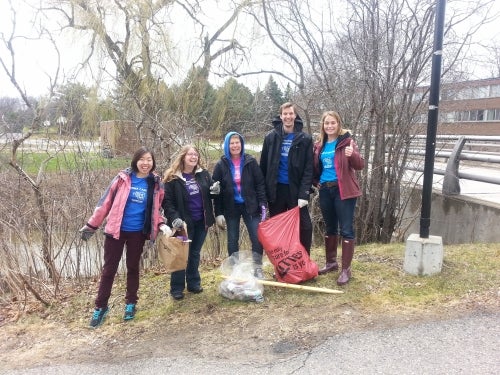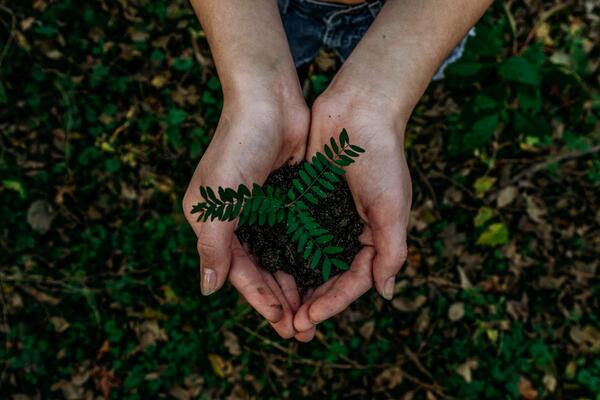
Honouring Earth Day at Waterloo
Join Waterloo’s campus clean up on April 21

Join Waterloo’s campus clean up on April 21
By Sustainability Office and Faculty of EnvironmentIn advance of Earth Day, the Sustainability Office and others from the community are organizing a campus clean-up on Friday. Earth Day is recognized on Saturday, April 22, and people around the world will celebrate the planet and commit to climate action. At the University of Waterloo, protecting biodiversity is a cornerstone of our sustainability strategy.
Waterloo’s 1200-acre property is home to a wide variety of species in both terrestrial and aquatic habitats, including birds, mammals, fish, and insects. Recognizing the responsibility of stewardship for this land, the Sustainability Office and Plant Operations have been developing a standard for how we maintain and care for our natural spaces on campus. This has led to initiatives with students, employees and faculty to identify opportunities for improvement, like using only native plant species in green spaces and creating a permeable pavement project that helps control runoff during heavy rainfall. The work has also included building a master plan designed to maintain existing open areas by moving new buildings and development to the edges of campus.
However, initiatives are by no means limited to the Sustainability Office or Plant Operations. There are many others advocating for nature and environmental protections on campus. The Society for Ecological Restoration – UW is a student group that hosts a variety of events to raise awareness and advocate for the protection of nature on and off campus. The Ecology Lab in EV1 supports lab and field activities, courses, projects, and outreach initiatives related to the study of our environment and helps students connect with the natural world through hands-on experiences. The EcoMap project plotted natural, semi-natural and landscaped areas on campus in order to enhance biodiversity data collection and monitoring.
Safeguarding nature is important for mitigating the climate crisis, but it also helps us live healthy and happy lives. Interacting with nature has many physical and mental health benefits, such as lowered stress, improved memory, and restored attention. The practice of mindfully walking through natural areas, known in English as “forest bathing” or Japanese as “shinrin-yoku,” helps reduce depression, fatigue, and anxiety. As an increasing number of people experience eco-anxiety, nature can help address feelings of anger and sadness associated with observing the effects of climate change. Intentionally spending time in nature helps cultivate a feeling of belonging to and a sense of the responsibility for the land.

Campus Housing clean-up volunteers from 2017
While green space may not be so visible on Waterloo’s main campus, nature is all around us. If you need a mood boost, take a walk by Columbia Lake in the north part of campus, explore the woodlot by Village 1, or stroll along Laurel Creek by the University colleges. Efforts are also underway to incorporate more greenery within the built environment through public green space such as the Peter Russell Rock Garden, pollinator gardens such as at Conrad Grebel and green roofs like at EV3.
On Friday, April 21, join the Sustainability Office and others from our community for a campus clean-up of litter hotspots. This is a great way to celebrate Earth Day, spend some time outdoors, and make an impact to the health of our planet and each other. Staff will be in the EV3 atrium from 11 a.m. to 2 p.m. to distribute supplies and direct groups.

Read more
Flood Impacts, Carbon Pricing and Ecosystem Sustainability (FINCAPES) is a multi-stakeholder feminist initiative, and a collaboration with Indonesia, enabling climate adaptation and conservation of biodiversity

Read more
Collaboration on more than 100 events show how post-secondary institutions can push sustainable development in Canada

Read more
New report defines our understanding of the climate crisis and shapes our sustainable future
The University of Waterloo acknowledges that much of our work takes place on the traditional territory of the Neutral, Anishinaabeg, and Haudenosaunee peoples. Our main campus is situated on the Haldimand Tract, the land granted to the Six Nations that includes six miles on each side of the Grand River. Our active work toward reconciliation takes place across our campuses through research, learning, teaching, and community building, and is co-ordinated within the Office of Indigenous Relations.